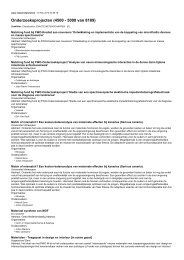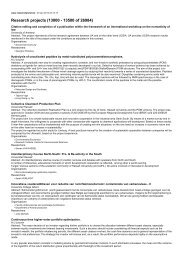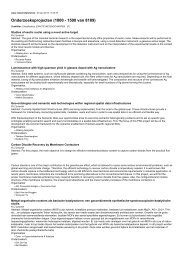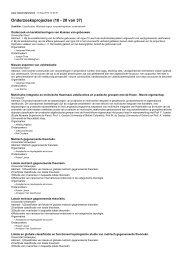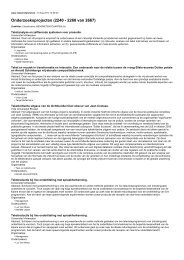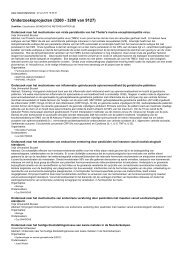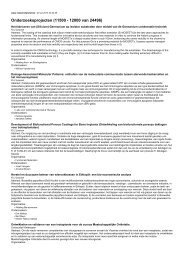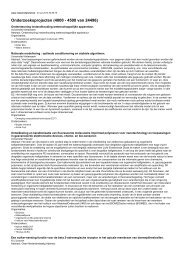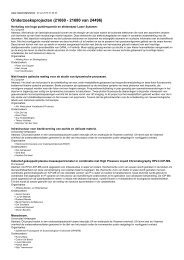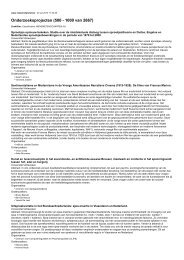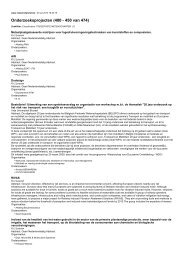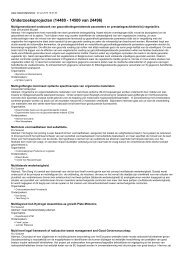Research projects (1 - 500 of 2917)
Research projects (1 - 500 of 2917)
Research projects (1 - 500 of 2917)
You also want an ePaper? Increase the reach of your titles
YUMPU automatically turns print PDFs into web optimized ePapers that Google loves.
Entrepreneurial networks in the Roman business world. Kinship, trust and cooperation and the impact <strong>of</strong> empire.<br />
Ghent University<br />
Abstract: This research project intends a structural analysis <strong>of</strong> business networks in Roman long-distance trade. We will focus on the business<br />
communities in Republican Delos and Imperial Puteoli and Ostia. The aim <strong>of</strong> the comparison is to assess whether the unification <strong>of</strong> the<br />
Mediterranean world under Roman rule altered the nature <strong>of</strong> merchant networks. As a working hypothesis, we assume this unification to facilitate<br />
commerce and create larger and more efficient networks.<br />
Organisations:<br />
• Department <strong>of</strong> History<br />
<strong>Research</strong>ers:<br />
• Koenraad Verboven<br />
Church Architecture in the Age <strong>of</strong> Reason: The Ethics<br />
Ghent University<br />
Abstract: This project aims to examine the concepts and ideas that relate church building to human passions and devotion in 18th century France<br />
and England. It wants to examine how views <strong>of</strong> this relation between church architecture, devotion and human passions were exchanged across<br />
Europe. In so doing, it also hopes to clarify the influence <strong>of</strong> confessional differences on church design.<br />
Organisations:<br />
• Departement <strong>of</strong> Architecture and urban planning<br />
<strong>Research</strong>ers:<br />
• Maarten Delbeke<br />
Vanden Twaelf dogheden: an exemplary study <strong>of</strong> the functions, distributuin and impact <strong>of</strong> Middle Dutch mustical writing<br />
Ghent University<br />
Abstract: the proposed project wants to examine the function, distribution and carry-over <strong>of</strong> a 14th-century mustical treatise, vanden twaelf<br />
dogheden, and in broader sense the development and impact <strong>of</strong> medieval and early modern spiritual literature.<br />
Organisations:<br />
• Departement <strong>of</strong> French<br />
<strong>Research</strong>ers:<br />
• Youri Desplenter<br />
the serial nature <strong>of</strong> experimentation<br />
Ghent University<br />
Abstract: this project proposes a systematic, philisophical analysis <strong>of</strong> experimentation udnerstood in terms <strong>of</strong> series. it aims to illuminate and<br />
understand how experiments connect sequentially, looking specifically at the early modern period, where serial experiments are abudant. its<br />
hypothesis is that serial experimentation is used to generate knowledge.<br />
Organisations:<br />
• Departement <strong>of</strong> Philosophy and moral sciences<br />
<strong>Research</strong>ers:<br />
• Eric Schliesser<br />
Case alternation in present-day German: A corpus-based analysis <strong>of</strong> the conditions <strong>of</strong> use <strong>of</strong> accusative and dative with<br />
non-transparent two-way prepositional verbs<br />
Ghent University<br />
Abstract: Building on corpus-based analysis, this project explores the motivations behind the case alternation between accusative and dative in<br />
verbal constructions with two-way prepositions in present-day German from a constructionist perspective, considering both cases as parts <strong>of</strong><br />
alternating constructions with semantic functions in their own right, and focusing on the interplay between the constructions and the semantic and<br />
morphosyntactic properties <strong>of</strong> the lexical items.<br />
Organisations:<br />
• Department <strong>of</strong> Latin and Greek<br />
<strong>Research</strong>ers:<br />
• Klaas Willems<br />
The Dawning <strong>of</strong> the Modern State: Institutional Reform, Financial Reconstruction and the Penetration <strong>of</strong> the State in the<br />
Austrian Netherlands<br />
Ghent University<br />
Abstract: This research project focuses on three consecutive plans <strong>of</strong> state reform in the eighteenth-century Southern Netherlands, which were<br />
chiefly pursued to cut government costs and to maximize tax income. The aim <strong>of</strong> the project is a better understanding <strong>of</strong> factors and actors<br />
furthering or hindering the modernization <strong>of</strong> the central governmental apparatus in the era <strong>of</strong> burgeoning Enlightenment ideas.<br />
Organisations:<br />
• Department <strong>of</strong> History<br />
<strong>Research</strong>ers:<br />
• René Vermeir<br />
Multilingual landscapes and linguistic vitality in urban surroundings: case-studies <strong>of</strong> Brussels and Amsterdam.<br />
Ghent University<br />
Abstract: This project aims to address the vitality and structured linguistic hierarchies <strong>of</strong> languages used and displayed in the linguistic landscapes<br />
<strong>of</strong> Brussels and Amsterdam by means <strong>of</strong> quantitative and qualitative methodologies as well as geographical analyses. The project also aims to<br />
address the current conceptual void and lack <strong>of</strong> clarity on the relation between vitality and linguistic landscapes in general.<br />
Organisations:<br />
• Department <strong>of</strong> Latin and Greek<br />
<strong>Research</strong>ers:<br />
• Stefaan Slembrouck<br />
Identity and stigmatization: the case <strong>of</strong> the Roman freedman. A qualitative analysis <strong>of</strong> the socialization and stratification<br />
<strong>of</strong> and the interaction between freed and freeborn Romans.<br />
Ghent University<br />
Abstract: This project focuses on the highly underrepresented group <strong>of</strong> Roman freedmen. The main goal is to find out which processes determined<br />
the interaction between Roman elites and freeborn ?commoners? on the one hand, and the ambivalent class <strong>of</strong> freedman on the other. Rather than



